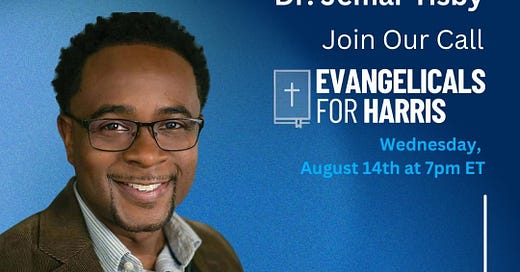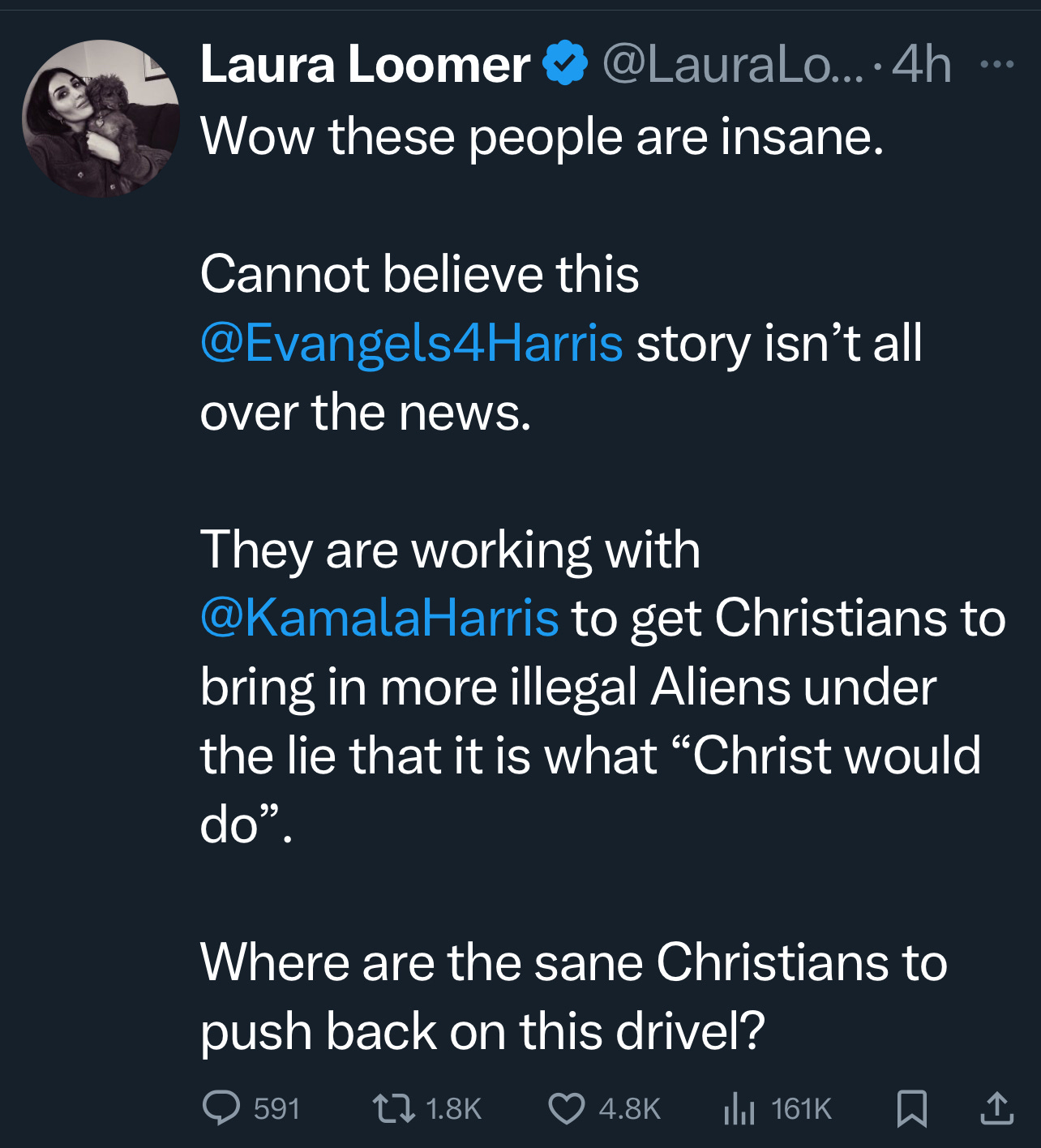My Comments on the Evangelicals for Harris Call
How to have a "thin" versus a "thick" political theology.
Some of you clicked on this article with great interest. If that’s you and you’re not a paid subscriber, then I ask you to become one today so I can keep delivering this content. Thank you.
On Wednesday, August 14, I spoke along with several others on the Evangelicals for Harris Zoom call.
From the moment the organization announced the event, all the speakers became the victims of online attacks.
Laura Loomer, a self-sytled “investigative” journalist with 1.2 million X/Twitter followers posted about many of us.
Nevertheless, we persisted in defending democracy.
Below are my remarks from the call.
Greetings, Evangelicals for Harris. I come to you as a Christian for democracy.
As someone who is concerned about democracy, I have said it before, and I’ll say it again:
“White Christian nationalism is the greatest threat to democracy and the witness of the church today.
It was present at the January 6th insurrection. It is the ideology behind Project 2025.
How did white Christian nationalism gain such prominence in our politics?
I contend that one reason is because white evangelicals have often practiced a “thin” political theology.
What is a thin political theology?
A thin political theology traffics in both sides-ism: both sides are equally bad, both sides are equally corrupt. Therefore, I can support neither.
A thin political theology votes on a single issue without understanding the interconnectedness of multiple issues.
A thin political theology contends there is only one true Christian party, one true Christian candidate, one true Christian way to vote.
White evangelicals have been left ill-equipped by this thin political theology to address the political mess they helped create.
This election requires something different. It requires a “thick” political theology.
Thick Political Theology
A thick political theology is able to exist within tensions; issues don't have to be black and white.
A thick political theology refrains from apathy and takes decisive action for democracy.
A thick political theology does not address the symptoms of a problem but seeks the source of those problems.
A thick political theology does not only rely on fear and intimidation, but paints a vision for a better future.
A thick political theology does not seek merely to deconstruct but to reconstruct something better.
A thick political theology recognizes that we are not seeking to create a theocracy but a democracy.
A thick political theology can accept that as much as we want our Christian convictions played out in the public sector, we live in a pluralistic society that must make room for opinions and positions that we personally reject but must have a hearing in a true democracy.
Learn from History
How can we develop a thick political theology?
Learn from history .
Malcolm X said, "Of all our studies, history is best qualified to reward our research."
One pattern history teaches us is that there is always a party of progress and a party of regress.
Speaking of regress, let’s review some history
In 1868, the Seymour/Blair presidential ticket ran with the motto: “This is a white man’s country; Let white men rule.”
In 1956, white Southern politicians got together and wrote the Southern Manifesto. It was designed to resist federal laws mandating racial desegregation. It served as a sort of precursor to Project 2025.
Remember the trope of Black “welfare queens”?
And the other party’s current presidential candidate attempted to institute a ban on immigration from predominantly Muslim countries. He called Haiti and other countries with mostly Black and brown people “sh*thole countries.”
We could go on.
Learn from the Black Christian Tradition
We can also learn a thick political theology from the historical witness of the Black Christian tradition.
This is the subject of my forthcoming book, "The Spirit of Justice: True Stories of Faith, Race, and Resistance.”
We can learn from Charles H. Pearce, an African Methodist Episcopal (AME) minister and abolitionist.
He said, “A man in this state cannot do his whole duty as a minister except if he but looks out for the political interests of his people.”
Pearce understood the necessity of pastors to look out for the "political interests." of their people. So, pastors, talk to you people about politics.
Learn from Frederick Douglass, a formerly enslaved man and the most well-known abolition of the 19th century.
He wrote a letter to someone saying:
“For the life of me I cannot see how any honest colored man who has brains enough to put two ideas together can allow himself under the notion of independence to give aid and comfort to the [other] party..."
He continued, "My advice to colored men everywhere is to stick to the [party of progress]. Tell your wants, hold the party up to its profession, but do your utmost to keep it in power in State and Nation."
Douglass was clear-eyed that in a two party system, there was a party of progress and a party of regress.
So he said, vote for the party of freedom, and when you do "hold the party up to its profession." Hold it accountable.
Learn from Fannie Lou Hamer who was born a poor sharecropper in Mississippi in 1917, and became an outspoken civil rights activist...because of her Christian faith.
She spoke at the 1964 Democratic National Convention as part of the Mississippi Freedom Democratic Party.
She said in her testimony: “Is this America, the land of the free and the home of the brave, where we have to sleep with our telephones off the hooks because our lives be threatened daily, because we want to live as decent human beings, in America?”
Is This America?
As I conclude, I echo Fannie Lou Hamer's question:
Is this America?
What kind of nation will we be?
Two paths lie ahead in this election: a white Christian nationalist authoritarian vision or a participatory, pmulti-racial democracy that moves us toward a more perfect union.
Evangelicals for Harris, it's time to employ a thick political theology that prioritizes the needs of our neighbors and a spirit of justice to protect and promote democracy.






Thank you, Jemar. Every time you post, I learn something new and come away with something to "chew on". Today I am enjoying the taste of evangelicals rallying behind Kamala and inviting you to speak on their program. I hope the Evangelicals for Harris website posts a recording of that call - I would love to listen to it.
On Monday night of this week I tuned in to the Christians for Kamala event, which IMHO was fabulous. The link is here: https://johnpavlovitz.com/christiansforkamala. Over and over, these speakers did a beautiful job of connecting the dots between Democratic values, issues and policies and the Gospel of Jesus Christ. For too long Democrats have ceeded control of the faith narrative to Republicans, who have abused it and used it to establish authoritarian control. This event reclaimed the true faith narrative for Democrats, and I pray that organizers will put this front and center stage at the Democratic convention next week.
Do I still use the term "evangelical"? Not on this side of the pond. People who know me know my influences include CS Lewis and NT Wright (who IMO define evangelicalism) but in today's America most so-called evangelicals only give lip-service to the first and have never heard of the second.
Why would an evangelical vote for Kamala Harris? For many reasons, including the very one given by that so-called "investigative journalist" above: Ms. Harris and her party treat people from other countries -- people who come to us asking for help -- as human beings. As Christians we would add that these new arrivals are beloved people made in the image of God. Scripture NEVER teaches us to attach labels ("illegals", "aliens"); scripture teaches us to welcome the stranger, care for the sick and injured, feed the hungry, heal the wounded. Jesus said: "As you do to others, you do to Me."